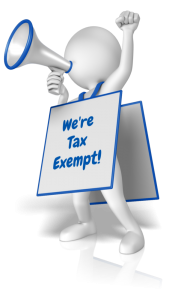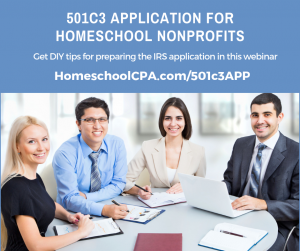In my webinars on Creating a Nonprofit for a Homeschool Community and 501c3 Application for Homeschool Nonprofits, I briefly mentioned that some homeschool groups can self declare tax exempt status.
I didn’t go into detail of HOW to self declare this tax exempt status. This blog post explains the HOW.
Background:
Organizations that are eligible to self declare 501 tax exempt status do not have to apply for tax exempt status with the IRS. So no Form 1023/1023-EZ or 1024 needs to be filed! This saves you time and money! Hooray.
But self-declared tax exempt organizations must still maintain that tax exempt status by filing an annual report with the IRS. This annual filing is Form 990/990-EZ or 990-N.
If you are a 501c7 social club
This status is common for homeschool support groups that focus on social activities and clubs rather than on educational activities
Self declare tax exempt status
Since you have not applied for 501(c)(7) status (you can “self declare” 501(c)(7) status and don’t have to file the paperwork), you are not on the IRS list of exempt organizations (yet) so you will not be able to file the 990-Ns. You will need to call the IRS Customer Account Services at 1-877-829-5500 and be added to their Exempt Organization list so you can begin filing the Form 990-Ns.
It typically takes 6 weeks after you call to be added to the IRS list of exempt organization.
Say something like this,
“We’re a brand new 501(c)(7) Social Club and we needed to get added to the IRS exempt organization list so we can start filing our 990-Ns.”
If you are a 501c3 Educational Organization
This status is common for tiny homeschool groups including co-ops, tutorials, youth sports, music and arts organizations that focus on educational activities.
Your organization’s total gross revenues must be less than $5,000 per year to be eligible to self declare 501(c)(3) tax exempt status.* 501(c)(7) social clubs mentioned above do not have that $5,000/year limitation. They can have gross revenues of more than $5,000/year and still self-declare tax exempt status.
Read about the difference between 501(c)(7) Social clubs and 501c3 organizations.
Since you have not applied for 501(c)(3) status, you are not in the IRS list (yet) so you will not be able to file the 990-Ns. You will need to call the IRS Customer Account Services at 1-877-829-5500 and be added to their Exempt Organization list so you can begin filing the Form 990-Ns.
“We’re a small 501(c)(3) educational organization with revenues of less than $5,000 per year. We understand we can self-declare our 501(c)(3) tax exempt status. We’d like to get added to the IRS exempt organization list so we can start filing our 990-Ns.”
*Note that only 501(c)(3) organizations with less than $5,000 annual gross revenues can “self-declare” their tax exempt status. 501(c)(3)s with more than $5,000/year in revenues must apply for 501(c)(3) status using IRS Form 1023 or the shorter Form 1023-EZ.
When you call the IRS…
During your call with the IRS, they will ask for your EIN and organization’s name, address, and a contact name. Have all that ready before you call.
- They may ask what date your fiscal year ends. Many support groups operate on a calendar year, but some operate on a school year with a year end of June 30 or July 31. You get to pick it!
- They may ask if you have “organizing documents.” They mean bylaws, Articles of Association (or Articles of Incorporation). So tell them if you have bylaws or Articles of Association/Articles of Incorporation. Samples can be found here.
- Is your organization a private foundation or public charity? Say “public charity” meaning you are funded by “the general public” , your participating families and not a single individual or family.
- Is your organization funded by another organization or a government entity? Say no, we are funded by the general public.
Call the IRS early in the morning. They open at 8 am local time and you can usually get through pretty quickly of you call then. Record the date you call, the IRS employee name and their identification number.
Don’t forget to the the 990-N every year!
Be sure you go online to file the Form 990-N anytime after your fiscal year ends and before its due date which is 4 1/2 months after the end of your fiscal year.
So if you operate on a calendar year, the 990-N is due May 15. If your fiscal year ends June 30, the From 990-N is due November 15 every year. File it at IRS.gov/990n

Have more questions about your homeschool organization’s tax exempt status? My book, The IRS and Your Homeschool Organization would be a big help.
If your 501(c)(3) educational organization grows and has more than $5,000 in revenues per year, it’s time to officially apply for 501(c)(3) tax exempt status.
This webinar 501c3 Application for Homeschool Nonprofits will explain how to do that.
Carol Topp, CPA
HomeschoolCPA.com



